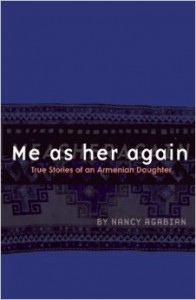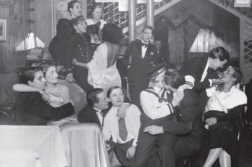 Gringa: A Contradictory Girlhood
Gringa: A Contradictory Girlhood
by Melissa Hart
Seal Press. 276 pages, $16.95
 Me as her again: True Stories of an Armenian Daughter
Me as her again: True Stories of an Armenian Daughter
by Nancy Agabian
Aunt Lute Books. 243 pages, $12.95
LATELY, it seems, bookstores have been inundated with a glut of memoirs written by everyday people with an axe to grind and a story to tell. Many of them aren’t worth the paper they’re written on. And some are priceless.
In Gringa: A Contradictory Girlhood, Melissa Hart writes that when she was in grade school, her mother fell in love with the bus driver who picked up Melissa’s younger brother for school each day. Smitten, Melissa’s mother packed up her children and a few belongings, left her husband, and moved in with the bus driver in a nearby town. The bus driver’s name was Patricia.
When Melissa’s father finally found the family, he brought the police, who removed the children from the house. A judge, later saying that being parented by two women “was unnatural,” gave custody to the father. Melissa’s mother was allowed to see her children twice a month, but for Melissa and her siblings, that wasn’t enough. They longed to be with their mother and the fun she offered. Life with her was an adventure. Not so with their staid, stern father and his new wife.
Through her childhood, Melissa, aching for her mother, strived to emulate her. She tried hard to “be a lesbian” but eventually realized that “you can’t alter nature.” Still, adolescence was difficult enough, and with an unconventional family in the 1970’s it was a guaranteed to make you a pariah. Writes Hart: “I had a vaudevillian great-grandmother who wore silk robes over hoary overalls, a grandmother who made Smurf costumes for a living, and a lesbian mom who subscribed to Ms. and Mother Jones. I was screwed.”
Conversely, author Nancy Agabian wrestled with her own sexuality, at one point adopting as her mantra: “I’m not gay, I’m not gay, I’m not gay.” In addition, all her life Agabian ran from her Armenian heritage. When her grandmother, a survivor of the World War I–era Armenian genocide, tried to tell stories, Agabian only paid half-attention. She cried and tried to wriggle out of Friday night Armenian school, and as soon as she was old enough, she broke the cultural dictate that single adult children live at home, moving to California to live on her own.
Ashamed of her looks, her background, and her virginity, Agabian found herself lusting for women and dating men, eventually deciding that she would fall in love with a “person, not a gender.” But her shame ended—and familial intrigue began—when she accompanied her aunties on a trip to learn the truth about her grandmother and her family.
While one could draw parallels between these two books (young girls growing up in left-of-normal families), the differences are also striking. Author Melissa Hart is flippant and often wryly humorous in her tale, and while she portrays her family as ultra-weird, it’s obvious that she adores them. That’s not to say that author Nancy Agabian’s family wasn’t loved, but her memoir contains less humor and more confusion and angst. Both authors struggled with their familial background while growing up, but Hart had an easier time coming to terms with it. Agabian fought her heritage until well into adulthood.
Also interesting is the way in which both authors are influenced by the sexuality of family members. Hart’s hippie-like mother was very open about her lesbianism and would clearly have been happy with any choice that her children made. Agabian’s mother repeatedly tried to talk her youngest child out of being a lesbian, and her frustration is palpable. It should be noted that both of Agabian’s siblings are gay.
On balance, the biggest difference between the two books is their readability. Hart’s memoir is lighter and easier going, a book that you want to read to the end. Agabian’s book, while well-written and insightful, could have ended forty pages before it did. Both are worthwhile contributions to the growing body of personal memoirs from everyday people with an exceptional past.







